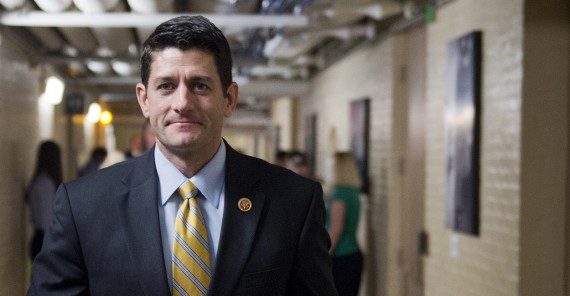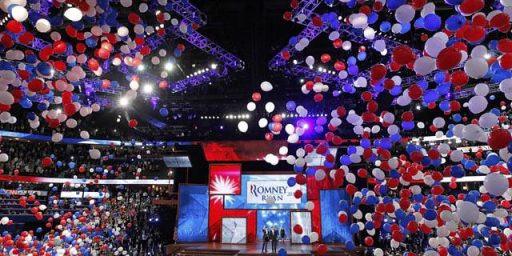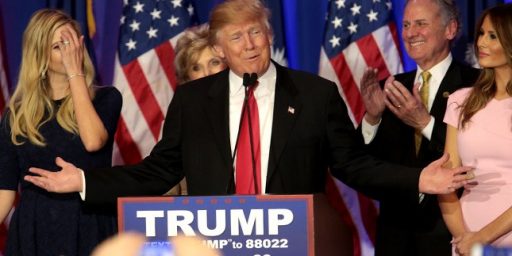Paul Ryan Rules Out The Idea Of Being Drafted As GOP Nominee
Paul Ryan takes himself out of contention as a potential Republican nominee.
Paul Ryan wants the speculation that he will somehow emerge from a divided Republican National Convention as the party’s Presidential nominee to come to an end:
After a month of speculation and pleas ranging from the comic to the mildly desperate, Speaker Paul D. Ryan held an unusually formal news conference Tuesday afternoon to rule out once and for all, he said, his candidacy for the Republican nomination for president.
“Let me be clear,” Mr. Ryan said. “I do not want nor will I accept the nomination of our party.” He added that he had a message for convention delegates: “If no candidate has the majority on the first ballot, I believe you should only turn to a person who has participated in the primary. Count me out.”
Mr. Ryan, who addressed reporters at the Republican National Committee’s headquarters on Capitol Hill on Tuesday, has repeatedly said that he believes the Republican nominee ought to be chosen by Republican primary voters from among the pool of candidates already in the race. But speculation about Mr. Ryan’s intentions has escalated in recent weeks as large segments of the Republican Party are in despair over their two leading candidates and his aides say the attention has become an increasing distraction.
The circus surrounding what in any other year would be a statement of the obvious — a newly installed speaker of the House does not wish to undo the will of thousands of voters and delegates in the dark of night at his party’s convention, which he oversees — is simply the latest strange turn in a race replete with them.
Although Mr. Ryan’s intent was to tamp down the chatter, the entire event took on a somewhat chaotic feel, as political protesters hollered outside and scores of reporters filed into a crowded room to hear Mr. Ryan say what he would not do.
When it was pointed out to Mr. Ryan that he also denied his desire to become speaker last year, Mr. Ryan said it was “apples and oranges.”
“Being speaker of the House is a far cry from being president of the United States,” he said, noting that his Republican colleagues chose him for the job.
But he did add, “Not running does not mean I am going to disappear.”
Although senior Republicans ranging from former Speaker John A. Boehner to Senator Orrin G. Hatch of Utah have mentioned Mr. Ryan as a potential alternative, there has been a slow backlash against the idea over the past week. Many Republicans worry that Mr. Ryan’s policy ideas are out of step with the current Republican base, that if he somehow were the nominee that it would inflame internal chaos in the party, and that worst of all, Mr. Ryan could lose.
Mr. Ryan’s remarks come just days after he returned from a trip to the Middle East where he visited with foreign leaders, and where gossip trailed him. “It’s amazing how closely our politics is followed overseas. I was asked about it everywhere I went,” he said. “I’m also aware that while I was overseas there was more speculation that someone other than the current candidates will emerge as our party’s nominee. I want to put that to rest once and for all.”
Mr. Ryan has repeatedly denounced several contentious statements made by Donald J. Trump this winter, but he has also said he would support whomever voters picked. Instead, he is focusing on a policy agenda in the House he hopes the eventual nominee will support.
More from The Washington Post:
House Speaker Paul D. Ryan (R-Wis.) on Tuesday delivered a forceful statement rejecting calls from establishment Republicans who want him to usurp their party’s presidential nomination from the remaining contestants in that race.
Ryan, who has spent a couple months making these statements, to no avail, arranged a hastily called afternoon news conference inside the Republican National Committee headquarters, where he insisted — in his clearest terms yet — to the GOP’s big donor and lobbyist class that he will not attempt to claim the nomination at the July convention in Cleveland.
“Let me be clear: I do not want nor will I accept the nomination for our party,” Ryan said.
Civil War general William Tecumseh Sherman often faced calls to run for president after he retired from the military, prompting his most famous declaration that lives on in politics today: “I will not accept if nominated and will not serve if elected.”
Ryan has made the equivalent of such statements about a possible 2016 run many times — in very clear terms. But worried about the possible nomination of Donald Trump or Sen. Ted Cruz (R-Tex.), Washington’s chattering class has largely decided to ignore the speaker’s statements, envisioning the 46-year-old in a head-to-head contest with the Democratic front-runner, Hillary Clinton.
Despite her own low favorability ratings as an elected official, Clinton crushes Trump in early horse-race polling, particularly in key battleground states where a clutch of key Senate and House races could be adversely impacted down-ballot by Trump’s candidacy. Cruz, running second to Trump for the GOP nomination, fares better than the real estate mogul but not by much, and the senator is loathed by a GOP establishment that has openly flouted his candidacy.
With it looking increasingly likely that no GOP candidate will claim the 1,237 delegates required to claim the nomination on the first ballot in Cleveland, some establishment Republicans have conjured dreams of Ryan jumping into the fray on the second, third and fourth ballots, at which point delegates to the Republican National Convention are not bound to vote for the candidate who won their state or district.
These veteran Republican operatives have kept the “Draft Ryan” movement alive despite repeated blunt statements by the speaker that he has no desire to take such a risky move.
As evidence of the emerging Ryan campaign, they’ve latched onto the production of campaign-style videos that have come out of the speaker’s office — although the previous speaker, John A. Boehner (R-Ohio), also issued these same glossy videos produced by the same aide. But Ryan was Mitt Romney’s running mate, and expectations around the Wisconsin Republican are different.
A month ago, after Boehner floated the idea of Ryan running, the current speaker cursed out his predecessor at a private event in Washington. The next day, he reiterated something he has said for many months: that to become president one has to run for president, and he decided last year not to do so.
“It’s not going to be me. It should be somebody running for president,” Ryan told the congressional press corps in mid-March.
On Tuesday, Ryan said that in his role as co-chairman of the convention — usually an honorific title given to the top two congressional caucus leaders — he plans to push a rule that would limit delegates to casting votes on any ballot to those that ran for the nomination in the primary season.
Trump’s campaign welcomed Ryan’s statement.
“We expect Paul Ryan means what he says and there’s not going to be anything for him to run for because we’re going to win on the first ballot,” said Trump senior adviser Paul Manafort. “And he’ll be the beneficiary of that because with us winning on the first ballot, we’ll unite the party and he’ll be able to have a Republican House of Representatives. And he knows that. Why would he want to risk a second or third ballot and the majority of the House? That doesn’t make sense.”
Besides his own unwillingness to run, Ryan would be taking an incredibly high-risk move if he were to acquiesce to the whisper campaign and try to secure the nomination in Cleveland.
Given that roughly 75 percent of Republican primary voters favor Trump or Cruz, both running against the establishment, it’s unclear that the delegates would even agree to nominate Ryan — an establishment favorite, though he has close ties to conservatives, whose career has been marked by mostly risk-averse moves.
Such a move could also prompt staunch conservatives to find a write-in candidate to vote for rather than backing Ryan.
If he were to get the nomination and lose the election to Clinton, Ryan’s tenure as House GOP leader also might come crumbling down, ending a political career that appears to have decades of potential to come.
As I noted earlier this month when the idea of a “Draft Ryan” movement was first being discussed among top Republicans and political analysts, the entire idea of bringing in Ryan to run for President rather than one of the people who went through the primary process was some combination of a fantasy out of The West Wing and a sign of desperation on the part of many top Republicans who have come to realize that their party may be stuck with either Donald Trump or Ted Cruz as their party’s Presidential nominee and who are now looking for a way out of a what seems like sure disaster in November. For one thing, there’s no reason to believe that the delegates in Cleveland, the majority of which are likely to remain at least somewhat loyal to the candidate to whom they are pledged, would readily accept the idea of someone who didn’t go through the vetting process of the primaries as the party’s nominee. The same is true of the larger base of the party as a whole, which seems like it would be unlikely to accept the idea of having their votes nullified by party insiders at the convention in this manner. Instead of unifying the party, picking an outsider like this, whether it’s Ryan, Mitt Romney, or anyone else, would be just as likely to tear the party apart as it would be to unify it.
From Ryan’s perspective, accepting the possibility of playing this kind of role at the convention seems as though it would clearly be career suicide for someone who is young enough to have a real future ahead of him. Because of the division it would create among Republicans, it’s highly unlikely that a Presidential ticket headed by Paul Ryan would do any better against Hillary Clinton than the last ticket he was part of did against Barack Obama four years ago, and it could quite possibly do worse with respect to the damage that could be done to the GOP majority in the Senate at the very least. Losing the Presidential election would likely mean that Ryan would ultimately end up losing the Speakership as well, at which point he’d be just another Congressman with nowhere to go. Instead, it would seem better for Ryan to stay in the House, where he’s likely to have a GOP majority at least through the 2020 election, and play his cards close to his vest. Additionally, it’s worth noting that as Speaker of the House Ryan will technically be the Presiding Officer at the convention. If the perception were set that he is surreptitiously pursuing the nomination on his own, it would likely make what is likely to be a contentious convention would become even more chaotic. In the long run, staying out of the fray is best for Ryan and the GOP.






Or it may cause them to burn their voter registration and vow never to vote Republican again.
Well, Ryan has finally done something nice for Democrats. I wonder what quid pro quo he will want.
Seriously, Ryan was the only GOP monster with both enough recognition value and good enough sheep’s clothing to worry me. With him out of the picture, they’re left with only the obviously evil, the obviously insane, and the beneath notice.
@DrDaveT: Maybe Michele Bachmann or Sarah Palin will consider running.
@DrDaveT: I don´t think that running the “Let´s privatize Social Security and Voucherize Medicare” guy is a good idea.
So that comment about “picking someone who participated in the primaries was a pointed nudge towards Kasich?
Maybe Ryan thinks that the upshot of all the back-room trading is going to be Kasich, who will flame out in the general because all the Trump and Cruz supporters will stay home in a snit. And then after the 4 or eight years of a Hillary presidency, up pops Ryan, rosy and beaming and ready to run? Trump won’t be around, and if it comes down to a dogfight between Cruz and Ryan, I know which side the Establishment will pick.
He also said that he didn’t want to be speaker of the house.
Ryan wants no part of the dumpster fire to come. Who can blame him?
Rep. Paul Ryan on House speaker’s job: Thanks, but no thanks
He is 46 years old. 2016 seems like a bad year to be the GOP nominee. 2020, 2024, and even 2028 are options for him. Work hard at his current job, and sometime in the next three elections he’ll be the obvious candidate.
” Don’t fire till you see the whites of their eyes,” is good strategy.
@Tony W: Michael Bloomberg is still a possibility; “the man who cleaned up New York City.”
@Tyrell: I would love to see a 5 way November race that included Bloomberg, Cruz, Trump, Sanders and Clinton. The sooner we break down this artificial dichotomy of Rs vs. Ds – the better.
@Tony W: The fun part of that would be watching the House Freedom Caucus explain how they would continue their extreme obstruction tactics no matter which of the 5 ultimately win.
One should keep in mind that Paul Ryan lies like a
Repubrug. However, as others above have pointed out, accepting a doomed nomination in ’16 would hurt his much better shot in ’20. So for once, I believe him. Mostly though, I agree with Charlie Pierce who said he trusted Paul Ryan as far as he could throw the City of Janesville.If Paul Ryan really, truly does NOT want to be president, he should become the GOP nominee.
dmhlt: http://instantrimshot.com/
The Republican nominee is almost sure to lose this year. I can’t see why any Republican who had long-term political ambitions would want to run in 2016, particularly after a tortured convention process.
I see Trump and Cruz both ending up in the same places — on TV and the book circuit — so it’s smart for them to give it a shot. But Ryan’s too young to throw it all away now.
@Tony W:
I they clearly fall in the “obviously evil and/or insane” set union described above.
@dmhlt: It’s not that he doesn’t want to be President; it’s that he doesn’t want to lose this year while spoiling his chances to win at another time.